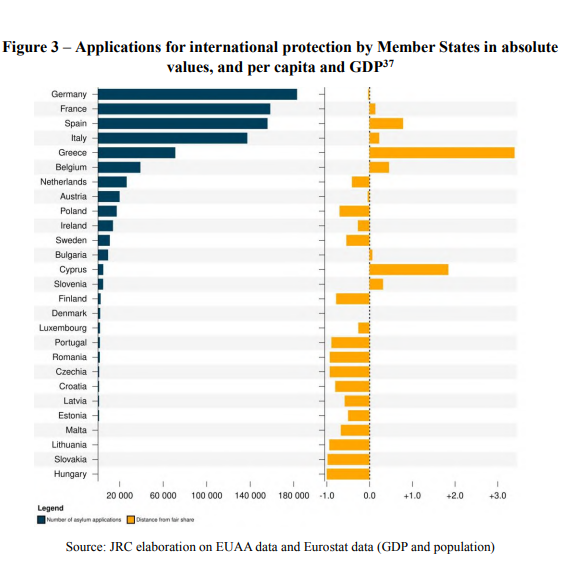The European Commission’s first Annual Asylum and Migration Report, released on 11 November, called Spain, Italy, Greece, and Cyprus “under migratory pressure,”- Euronews reports.
These countries faced a “disproportionate level” of migrant arrivals last year, including those rescued at sea.
Spain, Italy, Greece, and Cyprus will consequently benefit in 2026 from the solidarity of other EU member states, which may be demonstrated through the relocation of asylum applicants within their territory or via financial contributions.
Alongside this assessment, the Commission proposed to the 27 EU member states the Annual Solidarity Pool, a mechanism to establish the total number of asylum applicants to be relocated and the amount each country should contribute or compensate through payments. The pool’s proposal is not public. It will be discussed by the EU member states, which are set to decide the size and the solidarity share for each country by the end of the year.
Each member state—excluding those experiencing migratory pressure—must contribute proportionally based on its population and overall GDP. They may select from three options to fulfill the requirements of the solidarity pool: relocating a specified number of asylum seekers to their territory, paying €20,000 per individual not relocated, or providing operational support to member states under migratory pressure.
The ultimate decision will be made by EU member states through a qualified majority vote, with the legislative minimum for the solidarity pool established at 30,000 relocations and €600 million in financial contributions.
The Commission’s report additionally designates twelve states as being “at risk of migratory pressure”: Belgium, Bulgaria, Germany, Estonia, Ireland, France, Croatia, Latvia, Lithuania, the Netherlands, Poland, and Finland.
These countries are required to provide solidarity to those under migratory pressure, but their situation will be reevaluated to avoid disproportionate obligations in the following year.
A third group of countries has been designated as “experiencing a significant migratory situation”: Bulgaria, Czechia, Estonia, Croatia, Austria, and Poland. They are still obligated to demonstrate solidarity but may request an exemption from their quotas, which must be verified by the Commission and approved by other member states.
The report and the solidarity pool serve as the foundation for establishing the system of “mandatory solidarity” outlined in the Pact on Migration and Asylum, the comprehensive migration policy reform enacted in 2024.

Hungary, Poland Defiant
Several EU member states continue to oppose the framework proposed by the Pact on Migration and Asylum.Hungary’s Prime Minister Viktor Orbán, Poland’s Prime Minister Donald Tusk, and Slovakia’s Prime Minister Robert Fico have already declared that they will not enforce EU regulations, as they are unwilling to provide financial contributions or welcome migrants from other nations.
“Poland will not be accepting migrants under the Migration Pact. Nor will we pay for it,” Tusk wrote on Twitter shortly after the presentation of the report. Hungarian Prime Minister Viktor Orbán also took a hard line: “We will not implement the Migration Pact … We will not take in migrants, and we will not pay a single forint for them”. Budapest and Warsaw have not even presented their implementation plan for the Pact to the Commission, European Commissioner for Home Affairs Magnus Brunner admitted during a press conference.
This may result in the initiation of infringement proceedings against countries that do not make contributions when the regulation becomes effective in June 2026. The initial evaluation of the European Union’s new migration regulations is scheduled for next July, according to sources within the EU.
The only lawful means to exempt the solidarity contribution is to submit an application for an exemption, which is exclusively granted to countries designated as “facing a significant migratory situation” are the states belong to the third country group.
If the Commission and other member states approve the exemption, the requesting country is no longer obliged to admit asylum seekers or to provide compensation through financial contributions. The stake of that country shall not be redistributed among the other member states. According to the Commission’s report, the overall migratory situation within the European Union has shown improvement, with illicit border crossings decreasing by 35% during the reporting period from July 2024 to June 2025.

